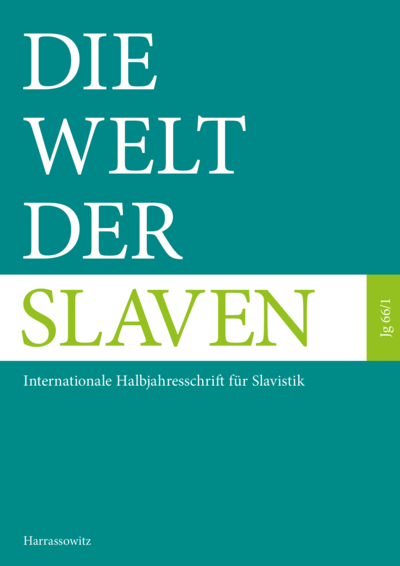Anarchism and art
The political roots of Šklovskij’s concept of estrangement
Schlagwörter:
Šklovskij, formalism, avant-garde, anarchy, TolstojAbstract
The aim of this article is to outline some connections between Šklovskij’s theory of estrangement (ostranenie) and certain anarchist ideas of the 19th century. At first glance this purpose might seem rather far-fetched. However, we will argue that the excessive use of quotations from Tolstoj that Šklovskij makes in his seminal work on estrangement – namely Art as Device (Iskusstvo kak priem, 1917) – is more than a mere coincidence. Via Tolstoj, Šklovskij could have received important anarchist ideas on the non-representational (or non-mimetic) character of art, which to a certain degree might have prefigured some corresponding concepts of the avant-garde movements.
In order to illustrate this outlined connection, we will proceed in two steps. Firstly, we will recapitulate some well-known ideas on certain anarchist traits of the avant-garde, especially regarding the way aesthetic and political questions seem to merge in its anarchist praxis. Secondly, we will trace back the connection between estrangement and anti-representation in the ethics and aesthetics of anarchism in the 19th century, especially via Šklovskij’s reading of Tolstoj.
Literaturhinweise
Bakunin, Mikhail. 2013a. Critique of Rousseau’s Theory of the State. In: Dolgoff, Sam (ed.). Bakunin on anarchism. New York, 102–148.
Bakunin, Mikhail. 2013b. The reaction in Germany from the notebooks of a Frenchman. In: Dolgoff, Sam (ed.). Bakunin on anarchism. New York, 55–58.
Bloch, Ernst. 1970. Entfremdung, Verfremdung: alienation, estrangement. The Drama Review 15(1), 120–125.
Bogdanov, Alexei. 2005. Ostranenie, kenosis, and dialogue: The metaphysics of Formalism according to Shklovsky. The Slavic and East European Journal 49(1), 48–62.
Boym, Svetlana. 2005. Poetics and politics of estrangement: Victor Shklovsky and Hannah Arendt. Poetics Today 26(4), 581–611.
Bürger, Peter. 1984. Theory of the Avant-Garde. Minneapolis.
Cohn, Jesse. 2006. Anarchism and the crisis of representation: Hermeneutics, aesthetics, politics. Selinsgrove.
Craver, David. 1995. The Aesthetics of disturbance: Anti-art in avant-garde drama. Ann Arbor.
Ėjchenbaum, Boris. 1928. Lev Tolstoj: Kniga pervaja. 50-ye gody. Leningrad.
Groys, Boris. 2008. The obligation to self-design. http://www.e-flux.com/journal/the-obligation-to-self-design/.
Günther, Hans. 1994. Ostranenie – ‘snjatie pokrovov’ i obnaženie priema. Russian Literature 36, 13–28.
Gurianova, Nina. 2012. The aesthetics of anarchy: Art and ideology in the early Russian Avant-Garde. Berkeley.
Gur’janova, Nina. 2012. ‘Deklaracija prav chudožnika’ Maleviča v kontekste moskovskogo anarchizma 1917–1918 godov. In: Ičin, Kornelija (ed). Iskusstvo suprematizma. Belgrade.
Hansen-Löve, Aage. 1978. Der russische Formalismus: Methodologische Rekonstruktion seiner Entwicklung aus dem Prinzip der Verfremdung. Wien.
Kropotkin, Petr. 1972. Mutual aid: A factor of evolution. London.
Lenin, Vladimir. 1954. Lev Tolstoj kak zerkalo russkoj revoljucii. Moskva.
Martin, Erik. 2011. Formen der Negation bei Lev Tolstoj. München.
Marx, Karl. 1978. The eighteenth Brumaire of Louis Bonaparte. In: Marx, Karl & Engels, Frederick. Collected Works. Vol. 11. New York, 99–198.
Poggioli, Renato. 1968. The theory of the Avant-Garde. Cambridge.
Proudhon, Pierre-Joseph. 2011. What is property?. In: Property is theft: A Pierre-Joseph Proudhon anthology. Edinburgh, 87–139.
Puchner, Martin. 2005. Poetry of the revolution: Marx, manifestos, and the avant-gardes. Princeton.
Rancière, Jacques. 2010. The aesthetic revolution and its outcomes. In: Rancière, Jacques: Dissensus: On politics and aesthetics. New York, 115–133.
Rancière, Jacques. 2013. The politics of aesthetics. The distribution of the sensible. London.
Savinkov, Boris. 1919. The pale horse. New York.
Shklovsky, Viktor. 1990. Art as device. In: Shklovsky, Viktor. Theory of prose. London, 1–15.
Šklovskij, Viktor. 1969. Iskusstvo kak priem. In: Striedter, Jurij (ed.). Texte der russischen Formalisten. München, 2–36.
Stirner, Max. 1995. The ego and its own. Cambridge.
Svetlikova, Ilona Ju. 2005. Istoki russkogo formalizma: Tradicija psichologizma i formal’naja škola. Moskva.
Tihanov, Galin. 2005. The politics of estrangement: The case of the early Shklovsky. The Slavic and East European Journal 49(1), 665–696.
Tolstoj, Lev N. 1951. Čto takoe iskusstvo? In: idem, Polnoe sobranie sočinenij. Moskva, vol. 30, 27–205.
Tolstoy, Leo. 1898. What is art? London.
Volin, Vsevolod. 2005. Neizvestnaja revoljucija 1917–1921. Moskva.
Wind, Edgar. 1963. Art and anarchy. London.

